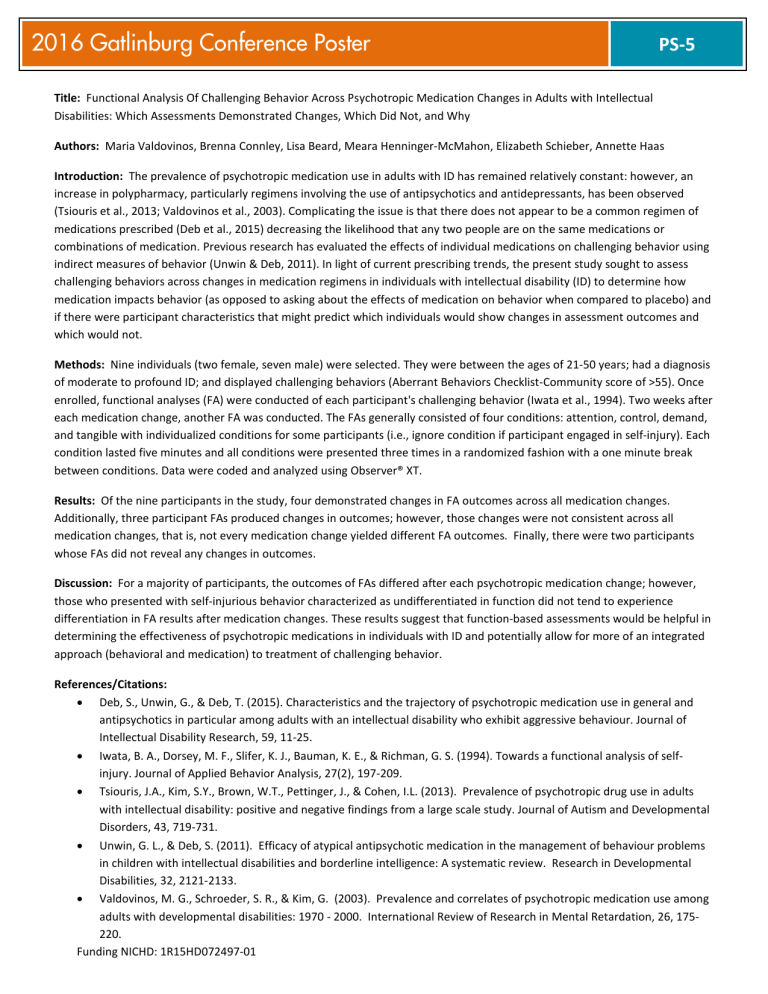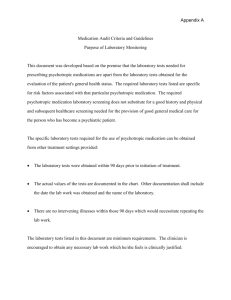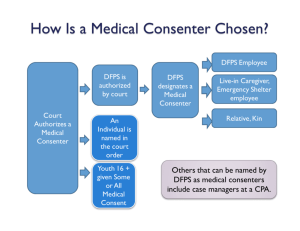2016 Gatlinburg Conference Poster PS-5

2016 Gatlinburg Conference Poster
PS-5
Title: Functional Analysis Of Challenging Behavior Across Psychotropic Medication Changes in Adults with Intellectual
Disabilities: Which Assessments Demonstrated Changes, Which Did Not, and Why
Authors: Maria Valdovinos, Brenna Connley, Lisa Beard, Meara Henninger-McMahon, Elizabeth Schieber, Annette Haas
Introduction: The prevalence of psychotropic medication use in adults with ID has remained relatively constant: however, an increase in polypharmacy, particularly regimens involving the use of antipsychotics and antidepressants, has been observed
(Tsiouris et al., 2013; Valdovinos et al., 2003). Complicating the issue is that there does not appear to be a common regimen of medications prescribed (Deb et al., 2015) decreasing the likelihood that any two people are on the same medications or combinations of medication. Previous research has evaluated the effects of individual medications on challenging behavior using indirect measures of behavior (Unwin & Deb, 2011). In light of current prescribing trends, the present study sought to assess challenging behaviors across changes in medication regimens in individuals with intellectual disability (ID) to determine how medication impacts behavior (as opposed to asking about the effects of medication on behavior when compared to placebo) and if there were participant characteristics that might predict which individuals would show changes in assessment outcomes and which would not.
Methods: Nine individuals (two female, seven male) were selected. They were between the ages of 21-50 years; had a diagnosis of moderate to profound ID; and displayed challenging behaviors (Aberrant Behaviors Checklist-Community score of >55). Once enrolled, functional analyses (FA) were conducted of each participant's challenging behavior (Iwata et al., 1994). Two weeks after each medication change, another FA was conducted. The FAs generally consisted of four conditions: attention, control, demand, and tangible with individualized conditions for some participants (i.e., ignore condition if participant engaged in self-injury). Each condition lasted five minutes and all conditions were presented three times in a randomized fashion with a one minute break between conditions. Data were coded and analyzed using Observer® XT.
Results: Of the nine participants in the study, four demonstrated changes in FA outcomes across all medication changes.
Additionally, three participant FAs produced changes in outcomes; however, those changes were not consistent across all medication changes, that is, not every medication change yielded different FA outcomes. Finally, there were two participants whose FAs did not reveal any changes in outcomes.
Discussion: For a majority of participants, the outcomes of FAs differed after each psychotropic medication change; however, those who presented with self-injurious behavior characterized as undifferentiated in function did not tend to experience differentiation in FA results after medication changes. These results suggest that function-based assessments would be helpful in determining the effectiveness of psychotropic medications in individuals with ID and potentially allow for more of an integrated approach (behavioral and medication) to treatment of challenging behavior.
References/Citations:
• Deb, S., Unwin, G., & Deb, T. (2015). Characteristics and the trajectory of psychotropic medication use in general and antipsychotics in particular among adults with an intellectual disability who exhibit aggressive behaviour. Journal of
Intellectual Disability Research, 59, 11-25.
• Iwata, B. A., Dorsey, M. F., Slifer, K. J., Bauman, K. E., & Richman, G. S. (1994). Towards a functional analysis of selfinjury. Journal of Applied Behavior Analysis, 27(2), 197-209.
• Tsiouris, J.A., Kim, S.Y., Brown, W.T., Pettinger, J., & Cohen, I.L. (2013). Prevalence of psychotropic drug use in adults with intellectual disability: positive and negative findings from a large scale study. Journal of Autism and Developmental
Disorders, 43, 719-731.
• Unwin, G. L., & Deb, S. (2011). Efficacy of atypical antipsychotic medication in the management of behaviour problems in children with intellectual disabilities and borderline intelligence: A systematic review. Research in Developmental
Disabilities, 32, 2121-2133.
• Valdovinos, M. G., Schroeder, S. R., & Kim, G. (2003). Prevalence and correlates of psychotropic medication use among adults with developmental disabilities: 1970 - 2000. International Review of Research in Mental Retardation, 26, 175-
220.
Funding NICHD: 1R15HD072497-01



